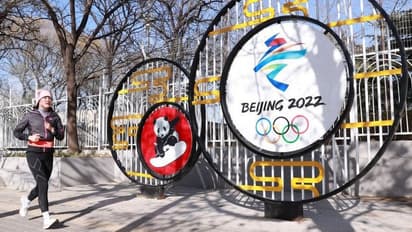'COVID, hostile forces': North Korea announces not to attend upcoming Winter Olympics

Synopsis
The government has maintained a stringent, self-imposed border lockdown, preventing even diplomats from entering and suffocating practically all trade.
In a letter to China, North Korea cited "hostile forces" and COVID-19 dangers for its inability to attend the next Winter Olympics in Beijing, accusing the US of attempting to derail the Games' success. It was unclear whether the letter from North Korea's Olympic Committee and Sports Ministry was only referring to its athletes, who are ineligible to compete after North Korea was suspended from the International Olympic Committee (IOC) until the end of 2022 for failing to send a team to the Tokyo Olympics last year, citing COVID-19 concerns.
A diplomatic mission was not mentioned in a description of the letter published by the state news agency KCNA. The government has maintained a stringent, self-imposed border lockdown, preventing even diplomats from entering and suffocating practically all trade. The letter criticised various actions taken by the United States, which indicated that its government officials would boycott the 2022 Winter Olympics due to China's human rights record while allowing US athletes to compete in Beijing. Several other countries, including Britain, Australia, and Canada, have also announced diplomatic boycotts.
The North Korean leader described the moves as 'an insult to the spirit of the international Olympic Charter'. He added that the US and its vassal forces are becoming increasingly brazen in their moves against China to prevent the Olympics from successfully opening.
Also Read | Japan says it has 'no intentions to send government officials' to Winter Olympics
North Korea has sent high-level political representatives to prior games, notably Kim Yo Jong, the sister of North Korean leader Kim Jong Un, to the 2018 Winter Olympics in South Korea. North Korea's second-highest official, Kim Yong Nam, visited Beijing for the Summer Olympics in 2008. Since the two countries signed a treaty in 1961, China has been North Korea's only significant friend. International sanctions imposed over Pyongyang's nuclear weapons and ballistic missile programmes have put Pyongyang more reliant than ever on Beijing for trade and other assistance.
Check the Breaking News Today and Latest News from across India and around the world. Stay updated with the latest World News and global developments from politics to economy and current affairs. Get in-depth coverage of China News, Europe News, Pakistan News, and South Asia News, along with top headlines from the UK and US. Follow expert analysis, international trends, and breaking updates from around the globe. Download the Asianet News Official App from the Android Play Store and iPhone App Store for accurate and timely news updates anytime, anywhere.